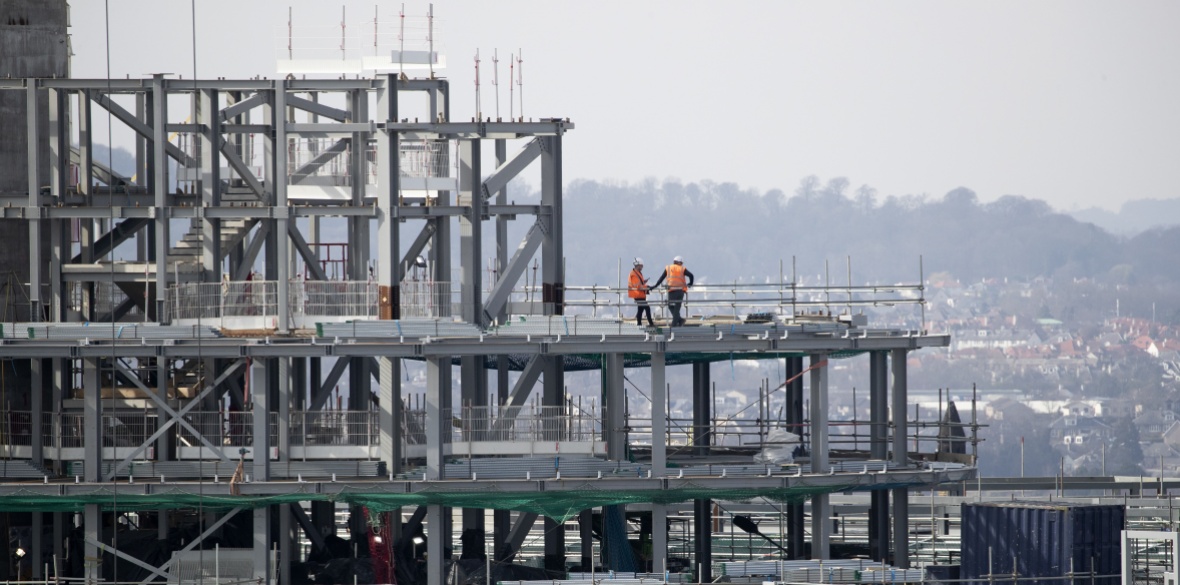This is the last article you can read this month
You can read more article this month
You can read more articles this month
Sorry your limit is up for this month
Reset on:
Please help support the Morning Star by subscribing here
“STAY at home unless you are an essential service.”
That’s the official advice for everyone right now. Except if you work on a building site.
Immediately after Boris Johnson’s speech, Secretary of State for Housing, Communities & Local Government Robert Jenrick tweeted “advice for the housing, construction and building maintenance industries,” which stated that “if you are working on site, you can continue to do so.”
The Tory minister, who spoke at the Downing Street briefing alongside the PM two days ago, even had the brass neck to end the tweet with the hashtag #StayHomeSaveLives.
So this morning, hundreds of thousands of construction workers crammed onto public transport or shared a van to get to site.
Some are working on luxury flats, tennis courts or swimming pools for the super-rich; others on huge infrastructure projects like Crossrail.
None can be considered “essential” — a few weeks’ delay in completing any contract is not going to cripple the entire economy.
The reason building sites are still open has got nothing to do with public health but everything to do with money.
The cartel of major contractors that run the British construction sector are huge financial donors to the Tory Party and appear to have lobbied hard to keep the sites open.
In addition, the government doesn’t want to have to pay the loss of income for about a million construction workers who are classified as “self-employed.”
Government and construction bosses talk a good game when it comes to safety, but in reality it’s all about the money.
If construction firms are genuinely concerned about workers’ safety, they would consult their workforces and close the sites.
Instead, an electrician on a project in central London was sacked yesterday for tweeting about the lack of social distancing on the job.
Others across the industry will have been victimised too; the multinationals that dominate the sector have a rich tradition of blacklisting union safety reps who stood up for their fellow workers.
One of the construction sites still open this morning was the mega MGT Power biomass power station project in Middlesbrough, with 1,700 workers on site.
The GMB safety rep on site, Simon Duncan, posted photographs of workers congregating at the start of the shift and asked a question on social media: “Please tell me, Mr Johnson, how do we adhere to social distancing?”
Within hours the project was shut down and all the workers sent home on full pay.
MGT isn’t the only construction project where workers are worried about their health.
Using the hashtag #ShutTheSites, concerned workers and their family members have flooded social media with stories of bosses telling them to come to work despite the apparent lockdown.
If your employer is still forcing people to work against their better judgement, now is the time to take a stand.
That means worried workers talking to each other and speaking to the boss collectively.
This is already taking place cross the country. The Health & Safety at Work Act 1974, the Management of Health & Safety at Work Regulations 1999, and the Employment Rights Act 1996 all give employees the right to leave their work if they feel they are in serious and imminent danger. Coronavirus couldn’t be more serious.
But if managers continue to ignore reasonable requests and health advice, then it’s time to organise coronavirus walkouts, to force greedy employers to close down any non-essential businesses.
In the US, unofficial action by auto workers shut down car plants, in Italy nationwide walkouts forced rogue firms to close and in Britain there has been action by refuse workers in Bexley to ensure all staff received sick pay from day one, irrespective of their contractual status.
Unfortunately, construction’s appalling fatality statistics and repeated prosecutions for breaches of safety are a clear indication that multinationals that dominate the sector regularly put profit before the health of their workforce.
Balfour Beatty has lived up to its reputation again today by issuing a statement declaring that all their sites will remain open.
Construction is a dangerous industry with woeful welfare facilities at the best of times.
We work as a part of a team, carrying heavy loads, whether that be in a trench or on a scaffold; social distancing is all but impossible.
Profiteering firms are literally putting lives at risk in order to make more money.
The government should order all building sites to close immediately. They should also compensate all workers designated as “self-employed” or engaged via an employment agency for their loss of income; without this millions of families will be forced into destitution.
And essentially, unions must stand by any groups of workers who are still being bullied by their employers to come into work.
This health emergency is too serious to be left in the hands of greedy bosses.
Dave Smith is a blacklisted safety rep in construction.











